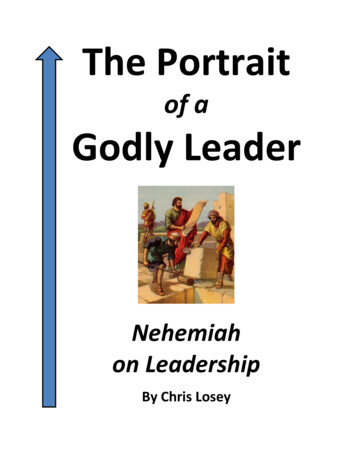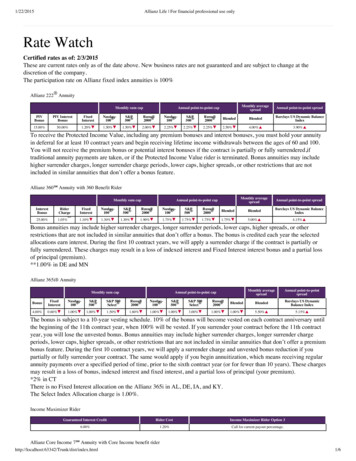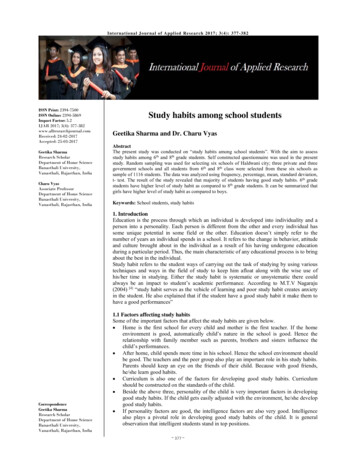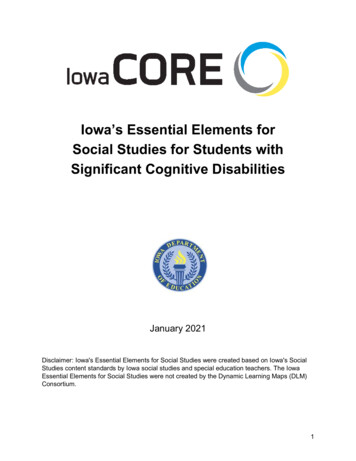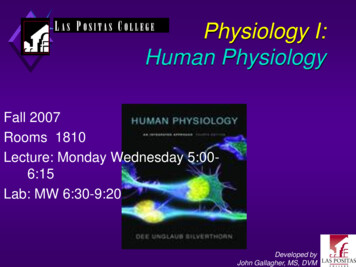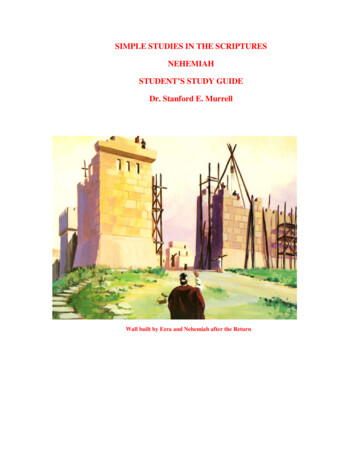
Transcription
SIMPLE STUDIES IN THE SCRIPTURESNEHEMIAHSTUDENT’S STUDY GUIDEDr. Stanford E. MurrellWall built by Ezra and Nehemiah after the Return
SIMPLE STUDIES IN THE SCRIPTURESNEHEMIAHSTUDENT’S STUDY GUIDEDr. Stanford E. Murrell2
NehemiahHuman Author: NehemiahDivine Author: God the Holy SpiritDate of Writing: c. 445 BCTheme: Returning to Jerusalem to rebuildIntroductionMatthew HenryThe Historical SettingThis book continues the history of the children of the [seventy year] captivity, the poor Jews thathad lately returned out of Babylon to their own land. At this time not only the Persian monarchyflourished in great pomp and power, but Greece and Rome began to be very great and to make afigure.The Importance of IsraelOf the affairs of those high and mighty states we have authentic accounts extant; but the sacredand inspired history takes cognizance only of the state of the Jews, and makes no mention ofother nations but as the Israel of God had dealings with them: for the Lord's portion is his people;they are his peculiar treasure, and, in comparison with them, the rest of the world is but aslumber.Two Great Men of God: Ezra and NehemiahIn my esteem, Ezra the scribe and Nehemiah the governor, though neither of them ever wore acrown, commanded an army, conquered a country, or was famed for philosophy or oratory, yetboth of them, being pious praying men, and very serviceable in their day to the church of Godand the interests of religion, were really greater men and more honorable than any of the Romanconsuls or dictators, or [the Greek historian] Xenophon [c.430 -c.355], or [the Greek orator]Demosthenes [384-322 BC], or [the Greek philosopher] Plato [427-347 BC] himself, who livedat the same time. These were the bright ornaments of Greece.Nehemiah: Governor of JudeaNehemiah's agency for the advancing of the settlement of Israel we have a full account of in thisbook of his own commentaries or memoirs, wherein he records not only the works of his hands,but the workings of his heart, in the management of public affairs, inserting in the story manydevout reflections and ejaculations, which discover in his mind a very deep tincture of seriouspiety and are peculiar to his writing. Twelve years, from his twentieth year Nehemiah 1:1 to histhirty-second year Nehemiah 13:6, he was governor of Judea, under Artaxerxes I [king of thePersian Empire from 465 BC to 424 BC], whom Dr. Lightfoot supposes to be the sameArtaxerxes as Ezra has his commission from.3
NEHEMIAHA Simple OutlineI. Nehemiah's concern for Jerusalem and the commission he obtained from the king to gothither, ch. 1, 2.II. His building the wall of Jerusalem notwithstanding the opposition he met with, ch. 3, 4.III. His addressing the grievances of the people, ch. 5.IV. His finishing the wall, ch. 6.V. The account he took of the people, ch. 7.VI. The religions solemnities of reading the law, fasting, and praying, and renewing theircovenants, to which he called the people (ch. 8-10).VII. The care he took for the replenishing of the holy city and the settling of the holy tribe, ch.11, 12.VIII.His zeal in reforming various abuses, ch. 13.The Last Historical BookSome call this the second book of Ezra, not because he was the penman of it, but because it is acontinuation of the history of the foregoing book, with which it is connected (v. 1). This was thelast historical book that was written, as Malachi was the last prophetical book, of the OldTestament.4
NEHEMIAH 11 THE words of Nehemiah the son of Hachaliah. And it came to pass in themonth Chisleu, in the twentieth year, as I was in Shushan the palace,TWENTIETH YEAR (1:1). This was the twentieth year of the reign of Artaxerxes Longimanus(455-444 BC.). Ninety-one or ninety two years had passed since the return from Babylon. It wasthe thirteenth year after Ezra's journey to Jerusalem.NEHEMIAH (ne-he-mi'ah; consoled by Jehovah), was the governor of the Jews, who was theson of Hachaliah, and brother of Hanani (Nehemiah 1:1; 7:2). He was a cupbearer to KingArtaxerxes. This close intimacy with the king enabled Nehemiah to obtain his commission asgovernor of Judea.HACHALIAH (hak-a-li'-ah; who waits for the Lord), HACALIAH, was the father of Nehemiah,the governor after the captivity, c. 446 BC, (Nehemiah 10:1).CHISLEU (lis'-lew), is the ninth month in the Hebrew calendar (Nov/Dec).SHUSHAN (shu-shan; lily), SUSA, refers to a city in Elam on the sunny plains of the Tigriswhich was the capital of Persia (Esth. 2:3; 9:11; Dan. 8:2).2 That Hanani, one of my brethren, came, he and certain men of Judah; and Iasked them concerning the Jews that had escaped, which were left of the captivity,and concerning Jerusalem.HANANI (ha-na'-ni; gracious), was a "brother" of Nehemiah who went from Jerusalem toShushan and later was made governor of Jerusalem under Nehemiah (Nehemiah 1:2; 7:2).JEW (a man of Judah), refers to a member of the state of JUDAH (2 Kings 16:6; Nehemiah 1:2;Jeremiah 32:12).3 And they said unto me, The remnant that are left of the captivity there in theprovince are in great affliction and reproach: the wall of Jerusalem also is brokendown, and the gates thereof are burned with fire.4 And it came to pass, when I heard these words, that I sat down and wept, andmourned certain days, and fasted, and prayed before the God of heaven,Nehemiah PraysNehemiah 1:5-115 And said, I beseech thee, O LORD God of heaven, the great and terrible God,that keepeth covenant and mercy for them that love him and observe hiscommandments:5
6 Let thine ear now be attentive, and thine eyes open, that thou mayest hear theprayer of thy servant, which I pray before thee now, day and night, for the childrenof Israel thy servants, and confess the sins of the children of Israel, which we havesinned against thee: both I and my father's house have sinned.7 We have dealt very corruptly against thee, and have not kept thecommandments, nor the statutes, nor the judgments, which thou commandedst thyservant Moses.COMMANDMENTS, refers to moral laws.STATUTES, refers to the ceremonial laws.JUDGEMENTS, refers to civil laws.8 Remember, I beseech thee, the word that thou commandedst thy servant Moses,saying, If ye transgress, I will scatter you abroad among the nations:9 But if ye turn unto me, and keep my commandments, and do them; thoughthere were of you cast out unto the uttermost part of the heaven, yet will I gatherthem from thence, and will bring them unto the place that I have chosen to set myname there.10 Now these are thy servants and thy people, whom thou hast redeemed by thygreat power, and by thy strong hand.11 O Lord, I beseech thee, let now thine ear be attentive to the prayer of thyservant, and to the prayer of thy servants, who desire to fear thy name: and prosper,I pray thee, thy servant this day, and grant him mercy in the sight of this man. For Iwas the king's cupbearer.Principles of PrayerNehemiah 1:5-11 Prayer is to be addressed to the LORD God of heaven.Prayer is to include honor and adoration.Prayer is to be personal.Prayer is to be intercessory.True prayer will acknowledge sin.Confession of sins can be for self and others.Confession of sin is to be specific.Appeal for mercy can be made on the basis of a covenant relationship.Prayer does not try to manipulate God or demand of Him but is one of supplication andappeals to divine mercy.6
CUPBEARER. The office of cupbearer was a position of great honor and confidence.Student’s Study GuideNehemiah 1Review1. According to Nehemiah 1:1 how old was Nehemiah when he made his inquiry aboutJerusalem?Answer.2. What were the conditions in Jerusalem according to Nehemiah 1:3?Answer.3. What important position did Nehemiah hold in the royal court as per Nehemiah 1:11?Answer.4. When Nehemiah discovered the wretched conditions that existed in Jerusalem what was hisreaction?Answer.5. List nine principles that undergirded the prayer life of Nehemiah.Answer. 7
Reflection1. Do you think most people come to faith in God at an early age or when they are older in life?Why is this so?2. Nehemiah showed an interest in those who were far removed from his place of residence. Doyou have concern for home and foreign missions? For whom are you concerned?3. Nehemiah was a man of prayer. Are you a person of prayer? How often do you pray? Do youhave an established time?4. Should Christians try to demand of God what He is to do in a given situation? Why or whynot?5. When you confess sins are you as specific as Nehemiah was?Personal Application1. What is the greatest crisis you have faced in life?2. How do you think of God? Do you think of Him mainly as a God of wrath or a God ofmercy?3. Have you ever fasted as a religious act of worship? Why or why not?4. Are you a person of prayer? Describe your prayer time for any given week.5. Have you ever had an occasion to remind God of His covenant promises?Memory WorkNehemiah 1: 5 And said, I beseech thee, O LORD God of heaven, the great and terrible God,that keepeth covenant and mercy for them that love him and observe his commandments:8
NEHEMIAH 21 AND it came to pass in the month Nisan, in the twentieth year of Artaxerxesthe king, that wine was before him: and I took up the wine, and gave it unto theking. Now I had not been beforetime sad in his presence.NISAN (ni'-san), is the first month (Mar/Apr) of the Hebrew sacred calendar, originally calledABIB. It marked the beginning of the barley harvest. Four months had passed since Nehemiahhad learned of the terrible condition of his countrymen at Jerusalem (2:1).2 Wherefore the king said unto me, Why is thy countenance sad, seeing thou artnot sick? This is nothing else but sorrow of heart. Then I was very sore afraid,3 And said unto the king, Let the king live for ever: why should not mycountenance be sad, when the city, the place of my fathers' sepulchres, lieth waste,and the gates thereof are consumed with fire?Nehemiah PraysNehemiah 2:44 Then the king said unto me, For what dost thou make request? So I prayed tothe God of heaven.5 And I said unto the king, If it please the king, and if thy servant have foundfavour in thy sight, that thou wouldest send me unto Judah, unto the city of myfathers' sepulchres, that I may build it.6 And the king said unto me, (the queen also sitting by him,) For how long shallthy journey be? And when wilt thou return? So it pleased the king to send me; andI set him a time.7 Moreover I said unto the king, If it please the king, let letters be given me to thegovernors beyond the river, that they may convey me over till I come into Judah;8 And a letter unto Asaph the keeper of the king's forest, that he may give metimber to make beams for the gates of the palace which appertained to the house,and for the wall of the city, and for the house that I shall enter into. And the kinggranted me, according to the good hand of my God upon me.9 Then I came to the governors beyond the river, and gave them the king's letters.Now the king had sent captains of the army and horsemen with me.9
10 When Sanballat the Horonite, and Tobiah the servant, the Ammonite, heard ofit, it grieved them exceedingly that there was come a man to seek the welfare of thechildren of Israel.2:10 GRIEVED THEM.Five Methods of Opposition MockeryAngerFightingPolitical AllianceAssassinationNehemiah 2:19Nehemiah 4:1-4Nehemiah 4:7-8Nehemiah 6:1-2Nehemiah 6:10-1411 So I came to Jerusalem, and was there three days.12 And I arose in the night, I and some few men with me; neither told I any manwhat my God had put in my heart to do at the gate of the valley, even before thedragon well, and to the dung port, and viewed the walls of Jerusalem, which werebroken down, and the gates thereof were consumed with fire.14 Then I went on to the gate of the fountain, and to the king's pool: but therewas no place for the beast that was under me to pass.2:14 KING'S POOL. Solomon's pool.15 Then went I up in the night by the brook, and viewed the wall, and turnedback, and entered by the gate of the valley, and so returned.2:15 BROOK. The brook Kidron.16 And the rulers knew not whither I went, or what I did; neither had I as yet toldit to the Jews, nor to the priests, nor to the nobles, nor to the rulers, nor to the restthat did the work.17 Then said I unto them, Ye see the distress that we are in, how Jerusalem liethwaste, and the gates thereof are burned with fire: come, and let us build up the wallof Jerusalem, that we be no more a reproach.18 Then I told them of the hand of my God which was good upon me; as also theking's words that he had spoken unto me. And they said, Let us rise up and build.So they strengthened their hands for this good work.10
19 But when Sanballat the Horonite, and Tobiah the servant, the Ammonite, andGeshem the Arabian, heard it, they laughed us to scorn, and despised us, and said,What is this thing that ye do? Will ye rebel against the king?SANBALLAT (san-bal'-lat), was a native of Beth-horon in Ephraim. When Nehemiah returnedwith others to Jerusalem to rebuild the walls of the city, Sanballat opposed the work (Nehemiah2:10).HORONITE (hor-o-nite), is a designation of Sanballat (Nehemiah 2:10,19; 13:28) whichindicated his origin in Moab (Beth-horon or Horonaim).TOBIAH (to-bi'-ah; good is Jehovah), was one of the opponents to the rebuilding of Jerusalemunder the leadership of Nehemiah. As a governor of the Ammonites (Nehemiah 2:10,19) heunited with Sanballet against the Jews.AMMONITE (am'-mon-ite), were a nomadic race descended from Ben-ammi, Lot's second sonby his daughter.GESHEM (ghe'-shem; shower), GASHMU, was an Arabian (Nehemiah 6:1, 26). When the Jewsreturned from the Babylonian exile Geshem was an enemy, especially wanting to kill Nehemiah,445 BC.ARABIAN (a-ra'-be-un), refers to an inhabitant of the Arabian Desert.2:19 THEY LAUGHED US TO SCORNSeven Adversaries of Nehemiah Sanballat the HoroniteTobiahGeshemEliashib the priestThe ArabiansThe AmmonitesThe AshdoditesNehemiah 2:19Nehemiah 2:19Nehemiah 2:19Nehemiah 3:1Nehemiah 4:7Nehemiah 4:7Nehemiah 4:720 Then answered I them, and said unto them, The God of heaven, he willprosper us; therefore we his servants will arise and build: but ye have no portion,nor right, nor memorial, in Jerusalem.11
Student’s Study GuideNehemiah 2Review1. Why did Nehemiah become frightened in the presence of the king?Answer.2. Seizing the moment Nehemiah explained his sadness. What did he say to the king?Answer.3. What request did Nehemiah ask of the king in regard to going to Jerusalem?Answer.4. What specific protection did Nehemiah ask of the king?Answer.5. List the seven enemies Nehemiah would eventually encounter.Answer. Reflection1. If someone asks how you are feeling or what might be wrong is it wrong to simply say,“Nothing”. Should Christians be socially honest or merely polite at such times?2. From the narrative while he was speaking to the king Nehemiah was engaged in the act ofprayer. Have you had this experience in prayer? While talking to someone have you everprayed silently for the situation? Please share an example.12
3. Was Nehemiah wise to ask for political protection? Is prudence a violation of the principle offaith?4. Have you ever been opposed in your spiritual journey of grace from doing spiritual work?Whom have you discovered to be your enemies? Were those hostile to you inside the churchor without?5. What arguments have people used against you to discourage you from spiritual labor?Personal Application1. Do you drink wine or other alcoholic beverages? Why or why not?2. Who or what do you fear in life?3. The Bible says to pray without ceasing (1 Thessalonians 5:17). Nehemiah did. Do you?4. What is your attitude towards government? How involved should Christians be in politics?Are you involved?5. Some situations demand holy boldness. Have you ever stood up to an evil person? What wasthe occasion? What was the result?Memory WorkNehemiah 2: 18 Then I [Nehemiah] told them [the Jews of Jerusalem] of the hand of my Godwhich was good upon me; as also the king's words that he had spoken unto me. And they said,Let us rise up and build. So they strengthened their hands for this good work.13
NEHEMIAH 31 THEN Eliashib the high priest rose up with his brethren the priests, and theybuilded the Sheep Gate; they sanctified it, and set up the doors of it; even unto thetower of Meah they sanctified it, unto the tower of Hananeel.3:1 SHEEP GATE, was located in the east wall of the city (John 5:2).ELIASHIB (e-li'-a-shib; God restores) was the high priest in Nehemiah's time (Nehemiah 3:1;13:4, 28). He was the grandson of Jeshua who had come from Babylon with Zerubbabel.MEAH, TOWER OF, refers to a tower of ancient Jerusalem located between the Tower ofHananeel and the Sheep Gate (Nehemiah 3:1).HANANEEL (ha-nan'-e-el; God has favored), TOWER OF, formed part of the N wall ofJerusalem in the days of Nehemiah (Nehemiah 3:1; 12:39).2 And next unto him builded the men of Jericho. And next to them buildedZaccur the son of Imri.JERICHO (jer'-ik-o), was a city located 5 miles W of the Jordan and 7 miles NW of the DeadSea. Following the return from the Babylonian Exile, men from Jericho helped to rebuild thewalls of Jerusalem.ZACCUR (zac'-cur; mindful), was a son of Imri. He worked on the walls of Jerusalem nearothers who were rebuilding some of the gates during the days of Nehemiah (Nehemiah 3:2).IMRI (im'-ri; eloquent), was the father of Zaccur who helped to repair the wall of Jerusalem, 445BC.3 But the Fish Gate did the sons of Hassenaah build, who also laid the beamsthereof, and set up the doors thereof, the locks thereof, and the bars thereof.HASSENAAH (has-se-na'-ah; thorny), was a Jew whose sons rebuilt the Fish Gate in the repairof the walls of Jerusalem, 445 BC, (Ezra 2:35; Nehemiah 7:38).4 And next unto them repaired Meremoth the son of Urijah, the son of Koz. Andnext unto them repaired Meshullam the son of Berechiah, the son of Meshezabeel.And next unto them repaired Zadok the son of Baana.14
MEREMOTH (mer'-e-moth; heights, exaltations), was one of the first priests to return to the cityof Jerusalem following the Babylonian exile.URIAH, URIJAH (u-ri'-ah), was the father of Meremoth (Ezra 8:33). He was with Ezra when thelaw was read (Nehemiah 8:4).KOZ (coz; thorn), COZ, HAKKOZ, was the father of Anub and others of the line of Judah (1Chron. 4:8). He was appointed by David to be the leader of the seventh division of priests, c.975BC (1 Chron. 24:10).MESHULLAM (me-shul'-lam; rapid, rewarded, friend), was the son of Besodeiah. Along withJehoiada, Meshullam repaired the Old Gate of Jerusalem, c. 445 BC, (Nehemiah 3:6).BERECHIAH, BERACHIAH, BARACHIAS, BARACHIAH (ber-eki'-ah; blessed of Jehovah),was the father of Meshullam the builder (Nehemiah 3:4, 30; 6:18).MESHEZABEEL, MESHEZABEL (me-shez'-a-be-el; God delivers), was the grandfather ofMeshullum, who worked to repair the wall of Jerusalem after the Babylonian captivity.ZADOK (za'-dok; just, righteous), was the son of Baana (Nehemiah 3:4).BAANA (ba'-an-ah; son of affliction), was a son of Zadok who assisted in repairing the walls ofJerusalem (Nehemiah 3:4) under the leadership of Nehemiah BC. 445.5 And next unto them the Tekoites repaired; but their nobles put not their necksto the work of their Lord.3:5 put not. The Tekoites were inhabitants of Tekoa, a town in Judah, 6 miles S of Bethlehem.Nehemiah notes that their nobles “put not their necks to the work of their Lord.”6 Moreover the Old Gate repaired Jehoiada the son of Paseah, and Meshullam theson of Besodeiah; they laid the beams thereof, and set up the doors thereof, and thelocks thereof, and the bars thereof.3:6 OLD GATE, refers to the Damascus Gate which is the main entrance to the city of Jerusalemon the northwest side.JEHOIADA (je-hoy-a-dah; Jehovah knows), a priest, was the son of Paseah (Nehemiah 3:6) whohelped to repair the Old Gate of Jerusalem, 446 BC.PASEAH (pa-se'-ah; lame), PHASEAH, (Nehemiah 7:51), was an ancestor of Nethinim whoreturned from the Babylonian captivity (Ezra 2:49). His son or descendant, Jehoiada, helped torestore one of the gates of the city of Jerusalem, c. 536 BC.15
MESHULLAM (me-shul'-lam; rapid, rewarded, friend), was the son of Besodeiah. Along withJehoiada, Meshullam repaired the Old Gate of Jerusalem, c. 445 BC, (Nehemiah 3:6).BESODEIAH (bes-o-di'-ah; in the counsel of Jehovah), was the father of Meshullam, the builderwho repaired the "Old Gate" of Jerusalem, 445 BC.7 And next unto them repaired Melatiah the Gibeonite, and Jadon theMeronothite, the men of Gibeon, and of Mizpah, unto the throne of the governoron this side the river.MELATIAH (mel-a-ti'-ah; Jehovah has delivered), refers to a Gibeonite who helped repair thewall of Jerusalem after the return from Babylon, 445 BC.GIBEON (ghibe'-e-on; hill city), was located 6 miles NW of Jerusalem. The inhabitants werecalled Gibeonites.JADON (ja'-don; judge), assisted in rebuilding the walls of Jerusalem after the Babylonianexiles, 445 BC.MERONOTHITE (me-ron'-o-thite), refers to the inhabitants of a district of Zebulum, such asJadon,, who assisted in the repair of the wall of Jerusalem after the return from the captivity.MIZPAH, MIZPEH (miz'-pah; look out, watch-tower), was a city of Benjamin in the region ofGeba and Ramah (1 Kin. 15:22). It was one of the sites fortified against the kings of the northerntribes of Israel by King Asa (1 Kin. 15:22).THRONE OF THE GOVERNOR (3:7). This may refer to the official residence of the governorof Syria in Jerusalem.ON THIS SIDE THE RIVER (3:7). Better, "beyond the river," referring to the west side of theEuphrates.8 Next unto him repaired Uzziel the son of Harhaiah, of the goldsmiths. Nextunto him also repaired Hananiah the son of one of the apothecaries [pharmacists],and they fortified Jerusalem unto the broad wall.UZZIEL (uz-zi'-el; power of God), was the son of Hashaiah, a goldsmith who helped to repairpart of the wall of Jerusalem after returning from the Babylonian captivity, c. 445 BC (Nehemiah3:8).HARHAIAH (har-ha-i'-ah; Jehovah is angry), was the father of Uzziel, who repaired part of thewall after returning from the Babylonian captivity, 445 BC.HANANIAH (han-a-ni'-ah; Jehovah has been gracious), was a son of Shelemiah who united withthe work of rebuilding the wall of Jerusalem following the Exile (Nehemiah 3:8).16
BROAD WALL, refers to a stretch of the wall of Jerusalem between the Tower of Furnaces andthe Gate of Ephraim repaired by the Jews during the days of Nehemiah.9 And next unto them repaired Rephaiah the son of Hur, the ruler of the half partof Jerusalem.REPHAIAH (ref-a-i'-ah; whom Jehovah healed), a son of Hur who helped Nehemiah rebuild thewall of Jerusalem.HUR (her; noble), was the father of Rephaiah, who assisted in the repair of the walls ofJerusalem in Nehemiah's time (Nehemiah 3:9).10 And next unto them repaired Jedaiah the son of Harumaph, even over againsthis house. And next unto him repaired Hattush the son of Hashabniah.JEDAIAH (jed-a-i'-ah; Jehovah has been kind; Jehovah has cast), assisted in rebuilding the wallsof Jerusalem (Nehemiah 3:10).HARUMAPH (ha-ru'-maf; snub-nosed; slilt-nosed), was the "father" of Jedaiah which latter wasone of the priests who repaired part of the walls of Jerusalem, 445 BC.HATTUSH (hat'-ush; assembled), was one of those who helped to repair the walls in Jerusalem(Nehemiah 3:10) opposite his house following the exile.HASHABNIAH (hash-ab-ni'-ah; Jehovah has taken account), was the father of Hattuck whohelped to repair the wall, 445 BC, (Nehemiah 3:10).11 Malchijah the son of Harim, and Hashub the son of Pahath-Moab, repaired theother piece, and the tower of the furnaces.MALCHIAH (mal-ki'-ah), MALCHIJAH, MELCHIAH, refers to a person who sealed thecovenant with Nehemiah.HARIM (ha'-rim; consecrated, devoted), was the father of Malchijah, who helped to repair a partof the broken wall of Jerusalem, 445 BC.HASHUB (ha'-shub; considerate), was the name of two persons who helped in rebuilding thewall of Jerusalem, 445 BC. He worked on the Tower of the Ovens. (Nehemiah 3:23; 10:23).PAHATH-MOAB (pa"-hath-mo'-ab; governor of Moab), was the leader of a family whichreturned to Jerusalem with Zerubbabel from the Babylonian captivity (Ezra 2:6; Nehemiah 7:11).3: 11 TOWER OF THE FURNACES. The reference may be to the ovens in the wall which wasadjoined to the baker’s street (Jeremiah 37:21). The ovens were made of clay from the valley. Itis possible that these potteries gave their name to the Gate of the Potteries (Jeremiah 19:2).17
12 And next unto him repaired Shallum the son of Halohesh, the ruler of the halfpart of Jerusalem, he and his daughters.SHALLUM (shal'-lum; recompense, retribution), was a son of Hallohesh. He ruled half ofJerusalem and worked with his daughters on the walls of the city of Jerusalem, 456 BC,(Nehemiah 3:12).HALOHESH (ha-lo'-hesh), HALLOHESH (hal-lo'-nesh; the whisperer, enchanter), was theancestral leader of a family that returned from the Babylonian exile. He signed the covenant withNehemiah (Nehemiah 10:24). The father of Shallum. Shallum would be one of those who helpedNehemiah to repair the damaged walls of Jerusalem, 445 BC.13 The Valley Gate repaired Hanun, and the inhabitants of Zanoah; they built it,and set up the doors thereof, the locks thereof, and the bars thereof, and a thousandcubits [1,500 ft] on the wall unto the Dung Gate.3:13 VALLEY GATE. Refers to the valley of Tyropeon, lying between the main city and theTemple hill.HANUN (ha'-nun; favored), was a Jew who helped to repair the Valley Gate of Jerusalem afterthe Babylonian captivity, 445 BC.ZANOAH (za-no'-ah; foul water), refers to a town in S Palestine located 15 miles W ofBethlehem (Joshua 15:34).14 But the Dung Gate repaired Malchiah the son of Rechab, the ruler of part ofBethh-accerem; he built it, and set up the doors thereof, the locks thereof, and thebars thereof.RECHAB (re'-kab; charioteer, horseman, rider), was the father of Malchiah. It was Malchiahwho repaired the "Dung Gate" of Jerusalem after the Babylonian captivity, c. 445 BC.BETH-HACCEREM, BETH-HACCHEREM (beth-hak'-se-rem; house of the vineyard), refers toa town in Judah on a high piece of ground, 4 1/2 miles W of Jerusalem (Jeremiah6:1).15 But the Gate of the Fountain repaired Shallun the son of Colhozeh, the ruler ofpart of Mizpah; he built it, and covered it, and set up the doors thereof, the locksthereof, and the bars thereof, and the wall of the pool of Siloah by the king'sgarden, and unto the stairs that go down from the city of David.18
SHALLUN (shal'-lun; retribution), was the son of Colhozeh, the ruler of part of Mizpah, 445BC.COLHOZEH (col-ho'-zeh; every prophet), was the son of Hazaiah and the father of Baruch(Nehemiah 11:5) who helped to repair part of the broken wall of Jerusalem.SILOAM (si-lo'-am), SILOAH (si-lo'-ah; sent), SHILOAH, SHELAH, refers to a famous poollocated in Jerusalem W of the Kidron Valley.16 After him repaired Nehemiah the son of Azbuk, the ruler of the half part ofBethzur, unto the place over against the sepulchres of David, and to the pool thatwas made, and unto the house of the mighty.NEHEMIAH (ne-he-mi'ah; consoled by Jehovah), was the son of Azbuk, ruler of Beth-zur. Hewas prominent in rebuilding the wall of Jerusalem (Nehemiah 3:16).AZBUK (az'-buk), was the father of a man named Nehemiah (Nehemiah3:16). He ruled part ofBeth-zur. He helped to repair part of the wall of Jerusalem after the return from Babylon c. BC445. Beth-Zur refers to a town in Judah located 4 miles N of Hebron.BETH-ZUR (beth'-zur; house of rock), refers to an elevated fortress 4 miles N of Hebron (2Chron. 11:7).17 After him repaired the Levites, Rehum the son of Bani. Next unto himrepaired Hashabiah, the ruler of the half part of Keilah, in his part.LEVITES (le'-vites). The reference is to the descendants of Levi, the third son of Jacob and Leah(Exodus 6:25; Joshua 21:3).REHUM (re'-hum; compassion), was a leader of the Levites who helped restore the wall ofJerusalem following the Babylonian exile (Nehemiah 3:17).BANI (ba'-ni; built), was a Levite who dwelt in Jerusalem after returning from Babylon.HASHABIAH (hash-a-bi'-ah; Jehovah reckons imputs), was a chief of the Levites who helped torepair part of the walls. He sealed the covenant with Nehemiah, 457 BC, (Nehemiah 10:11).KEILAH (ki'-lah; citadel), refers to a town in the S of Judah (Joshua 15:44). The citizens wereonce protected by David but were ungrateful. They were going to deliver him up to Saul so hefled.18 After him repaired their brethren, Bavai the son of Henadad, the ruler of thehalf part of Keilah.19
BAVAI, BAVVAI (bav'-a-i), was the son of Henadad and the ruler of a district of Keilah in thedays of Nehemiah. He helped to repair part of the wall of Jerusalem.HENADAD (hen'-a-dad; favor of Hadad), was a Levite whose sons were active in rebuilding theTemple following the Babylonian captivity (Ezra 3:9; Nehemiah 3:18,24). Two sons were namedBavai and Binnui, 536 BC.19 And next to him repaired Ezer the son of Jeshua, the ruler of Mizpah, anotherpiece over against the going up to the armory at the turning of the wall.EZER (e'-zur; treasure), was the son of Jeshua, a ruler of Mizpah, who repaired part of the citywalls near the armory.JESHUA (jesh'-u-ah; Jehovah is salvation), was the father of EZER and a ruler of Mizpah, whorepaired part of the city walls near the armory (Nehemiah 3:19).20 After him Baruch the son of Zabbai earnestly repaired the other piece, fromthe turning of the wall unto the door of the house of Eliashib the high priest.BARUCH (ba'-rook; blessed), was a son of Zabbai who assisted Nehemiah in BC 445 to repairthe walls of Jerusalem (Nehemiah 3:20). He worked on the NE angle of Zion and the house ofEliashib the high priest.ZABBAI (zab'-bahee; humming), was the father of the Baruch who assisted rebuilding the wallof Jerusalem after returning from the Babylonian captivity, 445 BC (Nehemiah 3:20).21 After him repaired Meremoth t
servant, and to the prayer of thy servants, who desire to fear thy name: and prosper, I pray thee, thy servant this day, and grant him mercy in the sight of this man. For I was the king's cupbearer. Principles of Prayer Nehemiah 1:5-11 Prayer is to be addressed to the LORD God of heaven.


